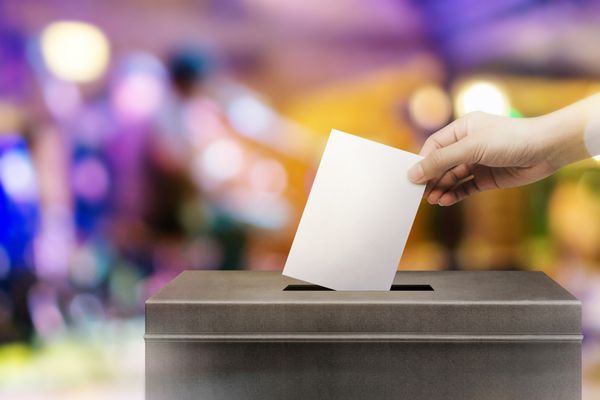11.6.1
Future Perfect
Future Perfect
Future Perfect
The future perfect tense describes an action that will be finished before another action in the future. The future perfect tense can also express strong probability.


Future perfect
Future perfect
- We can use the future perfect tense to:
- Describe an action that will be finished before another action in the future
- Express strong probability


Forming the future perfect tense
Forming the future perfect tense
- To form the future tense:
- Start with the future tense of the auxiliary verbs avoir (to have) or être (to be)
- Add the past participle after the auxiliary verb


Regular -er verbs
Regular -er verbs
- Here are some examples of regular -er verbs in the future perfect tense.
- J’aurai visité toutes les capitales européennes avant mes 18 ans.
- I will have visited all the European capitals before my 18th birthday.
- J’aurai déménagé de chez mes parents avant la fin de mes études.
- I will have moved out of my parents’ house before the end of my studies.


Regular -ir verbs
Regular -ir verbs
- Here are some examples of regular -ir verbs in the future perfect tense.
- Il aura choisi de rester chez ses parents car il ne travaille pas.
- He will have chosen to stay at his parents’ as he does not work.
- Ils auront réfléchi à leur engagement de volontaire avec Médecins sans Frontières.
- They will have thought about their voluntary work for Doctors Without Borders.


Regular -re verbs
Regular -re verbs
- Here are some examples of regular -re verbs in the future perfect tense.
- La victoire aura dépendu de la participation des jeunes aux élections.
- The victory will have depended on the participation of young people in the elections.
- Le parti actuellement au gouvernement aura perdu les élections d’ici ce soir.
- The party currently in government will have lost the elections by tonight.
1The Changing Nature of Family
1.1Soucis et problèmes de famille
1.2Monoparentalité, homoparentalité etc
2The 'cyber-society'
2.1Qui sont les cybernautes ?
2.2Comment la technologie facilite la vie quotidienne
3The Place of Voluntary Work
3.1Qui sont et que font les bénévoles ?
3.2La valeur du bénévolat
4Diverse Society
4.1L'enrichissement dû à la mixité
4.2Tolérance et respect
5The Marginalised
5.1Qui ils sont
5.2Comment aider
6How Criminals Are Treated
6.1Quelles attitudes envers la criminalité ?
6.2La prison – échec ou succès ?
7A Culture Proud of its Heritage
7.1Le patrimoine - national, régional et local
7.2Comment le patrimoine reflète la culture
7.3Le patrimoine et le tourisme
8Cinema: the 7th Art Form
8.1Pourquoi le septième art?
8.2Le cinéma - une passion nationale ?
9Demonstrations, strikes – who holds the power?
9.1Le pouvoir des syndicats
9.2Manifestations et grèves – sont-elles efficaces ?
10Politics & Immigration
10.1Politiques d'intégration et immigration
10.2L'immigration et les partis politiques
10.3L'engagement politique des immigrés
11Conjugation & Use of Tenses
11.1Present Tense
11.1.1Irregular IR Verbs That End in 'vrir'
11.1.2Irregular RE Verbs
11.1.3RE Present Participle
11.1.4Irregular IR Verbs With No Pattern
11.1.5Irregular IR Verbs That End in 'enir'
11.1.6Regular IR Verbs
11.1.7Reflexive Verbs
11.1.8ER Present Participles
11.1.95 Common IR Verbs
11.1.10Stem-Changing Verbs
11.1.11Irregular Present Participles
11.1.12Irregular IR Verbs Like 'Partir'
11.1.13Regular RE Verbs
11.1.14Irregular ER Verbs - Aller
11.1.15Modal Irregular IR Verbs
11.1.165 Common RE Verbs
11.1.17Irregular RE Verbs With No Pattern
11.1.18Avoir
11.1.19Être
11.1.20Regular ER Verbs
11.1.21IR Present Participle
11.1.225 Common ER Verbs
11.2Perfect Tense
11.3Imperfect Tense
11.4Future Tense
11.5Conditional Tense
11.6Future Perfect Tense
11.7Conditional Perfect Tense
12Extra Grammar
12.2Adjectives
12.3Numerals
12.4Adverbs
12.5Quantifiers & Intensifiers
12.6Pronouns
12.7Passive Voice
12.8Prepositions
12.9Conjunctions
12.10Negation
12.11Questions
Jump to other topics
1The Changing Nature of Family
1.1Soucis et problèmes de famille
1.2Monoparentalité, homoparentalité etc
2The 'cyber-society'
2.1Qui sont les cybernautes ?
2.2Comment la technologie facilite la vie quotidienne
3The Place of Voluntary Work
3.1Qui sont et que font les bénévoles ?
3.2La valeur du bénévolat
4Diverse Society
4.1L'enrichissement dû à la mixité
4.2Tolérance et respect
5The Marginalised
5.1Qui ils sont
5.2Comment aider
6How Criminals Are Treated
6.1Quelles attitudes envers la criminalité ?
6.2La prison – échec ou succès ?
7A Culture Proud of its Heritage
7.1Le patrimoine - national, régional et local
7.2Comment le patrimoine reflète la culture
7.3Le patrimoine et le tourisme
8Cinema: the 7th Art Form
8.1Pourquoi le septième art?
8.2Le cinéma - une passion nationale ?
9Demonstrations, strikes – who holds the power?
9.1Le pouvoir des syndicats
9.2Manifestations et grèves – sont-elles efficaces ?
10Politics & Immigration
10.1Politiques d'intégration et immigration
10.2L'immigration et les partis politiques
10.3L'engagement politique des immigrés
11Conjugation & Use of Tenses
11.1Present Tense
11.1.1Irregular IR Verbs That End in 'vrir'
11.1.2Irregular RE Verbs
11.1.3RE Present Participle
11.1.4Irregular IR Verbs With No Pattern
11.1.5Irregular IR Verbs That End in 'enir'
11.1.6Regular IR Verbs
11.1.7Reflexive Verbs
11.1.8ER Present Participles
11.1.95 Common IR Verbs
11.1.10Stem-Changing Verbs
11.1.11Irregular Present Participles
11.1.12Irregular IR Verbs Like 'Partir'
11.1.13Regular RE Verbs
11.1.14Irregular ER Verbs - Aller
11.1.15Modal Irregular IR Verbs
11.1.165 Common RE Verbs
11.1.17Irregular RE Verbs With No Pattern
11.1.18Avoir
11.1.19Être
11.1.20Regular ER Verbs
11.1.21IR Present Participle
11.1.225 Common ER Verbs
11.2Perfect Tense
11.3Imperfect Tense
11.4Future Tense
11.5Conditional Tense
11.6Future Perfect Tense
11.7Conditional Perfect Tense
12Extra Grammar
12.2Adjectives
12.3Numerals
12.4Adverbs
12.5Quantifiers & Intensifiers
12.6Pronouns
12.7Passive Voice
12.8Prepositions
12.9Conjunctions
12.10Negation
12.11Questions
Unlock your full potential with Seneca Premium
Unlimited access to 10,000+ open-ended exam questions
Mini-mock exams based on your study history
Unlock 800+ premium courses & e-books